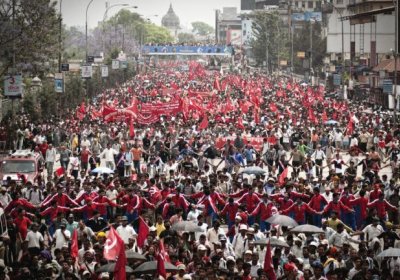The Sydney launch of the Four Days in July national Aboriginal rights convergence was addressed by journalist John Pilger, Alyawarr peoples’ walk-off spokesperson Richard Downs, Maritime Union of Australia Sydney branch secretary Paul McAleer and Larissa Behrendt, Professor of Law and Director of Research at the Jumbunna Indigenous House of Learning at UTS. More than 300 people attended the April 23 meeting.
835
The following statement for May Day 2010 has been endorsed by socialist, trade union and progressive organisations in the Asia-Pacific region, including groups in Australia, New Zealand, Bangladesh, India, Indonesia, Korea, Malaysia, Pakistan and the Philippines. Full list of endorsements.
* * *
All over the world workers are organising…
Over April 17-18, Tamils across Australia voted overwhelmingly in favour of the formation of an independent and sovereign homeland — Tamil Eelam — in the north and east of Sri Lanka.
In what was described by organisers as “the most successful political event for the diaspora in Australia”, 99.38% of participants voted “yes”.
Venezuela’s principal trade union federation, the National Union of Workers (Unete), held the second session of its extraordinary congress on April 24, in a push to re-launch the federation.
Hundreds of trade union delegates from around the country gathered in Union House in El Paraiso to discuss and vote on new set of statutes for the federation and a plan to organise nationwide elections scheduled for July.
The United Socialist Party of Venezuela (PSUV) concluded its five-month extraordinary congress on April 25 with the approval of highly anticipated party principles and statutes. This was just in time for primaries on May 2, in which millions of PSUV members will choose parliamentary candidates to run against a newly united opposition platform called the “Democratic Alternative” in September.
On May 1 in Kathmandu, between 500,000-1 million people took over the streets in a dramatic show of force by Nepal’s Maoists to demand a return to civilian rule and a democratic process of creating a new, pro-people constitution. With the government refusing popular demands for its resignation, an indefinite general strike has been called from May 2 in what the Maoists are calling a “final push” to resolve the struggle for power between the poor majority and Nepal’s elite.
Bolivia's World People's Summit on Climate Change and the Rights of Mother Earth was radical, inspiring, uncompromising and exactly what was needed.
Up to 30,000 people from six continents took part in the summit, which was held in the Bolivian city of Cochabamba from April 19 to 22.
The huge oil spill from a BP rig in the Gulf of Mexico underscores the summit’s significance. About 800,000 litres of oil are spewing out a day. The company admits it may not be able to stop the leak for weeks — or even months.
Hip-hop artist Chuck D, best known as a rapper with progressive band Public Enemy, has released a new track in response to the extreme racist, anti-immigrant law passed on April 23 in Arizona entitled “Tear Down That Wall”. The song can be downloaded at SLAMjazz.com. Chuck D and his wife, Dr Gaye Theresa Johnson (director of Black and Chicano studies at UC Santa Barbara), also released the following statement against the racist law.
* * *
The World People’s Conference on Climate Change and the Rights of Mother Earth held in April 19-22 in Cochabamba, adopted a People’s Agreement on tackling climate change. Some of its key points are listed below. Visit Pwccc.wordpress.com to read the full document, and other resolutions adopted by the summit.
The People’s Agreement includes the following points:
This will be the last column I write about the major league baseball team Arizona Diamondbacks in the foreseeable future. For me, they do not exist.
They will continue to not exist in my mind as long as the horribly named anti-immigrant “Support Our Law Enforcement and Safe Neighborhoods Act”, signed into law on April 23, remains on the books in Arizona.
This law has brought echoes of apartheid to the state.
In protests around the country on Workers Memorial Day, April 28, thousands of workers came out to remember those killed on the job and to protest against the Australian Building and Construction Commission (ABCC).
Speakers pointed out that since the ABCC was formed, deaths in the construction industry had risen from 3.14 deaths per 100,000 workers in 2004, to 4.27 in 2008. The rate peaked in 2006, at 5.6.
The Rudd government’s home insulation program, under which four workers died and there have been 120 house fires, also came under attack.
After weeks of political wrangling and uncertainty since the March 20 state elections, a new government has been formed in Tasmania. For the first time in Australia’s history, the Greens will have ministry positions.
The Labor Party and the Greens agreed to a “power sharing deal”, which offered a ministry for Greens leader Nick McKim and a cabinet secretary position for Greens MP Cassy O’Connor.
- Previous page
- Page 3
- Next page




